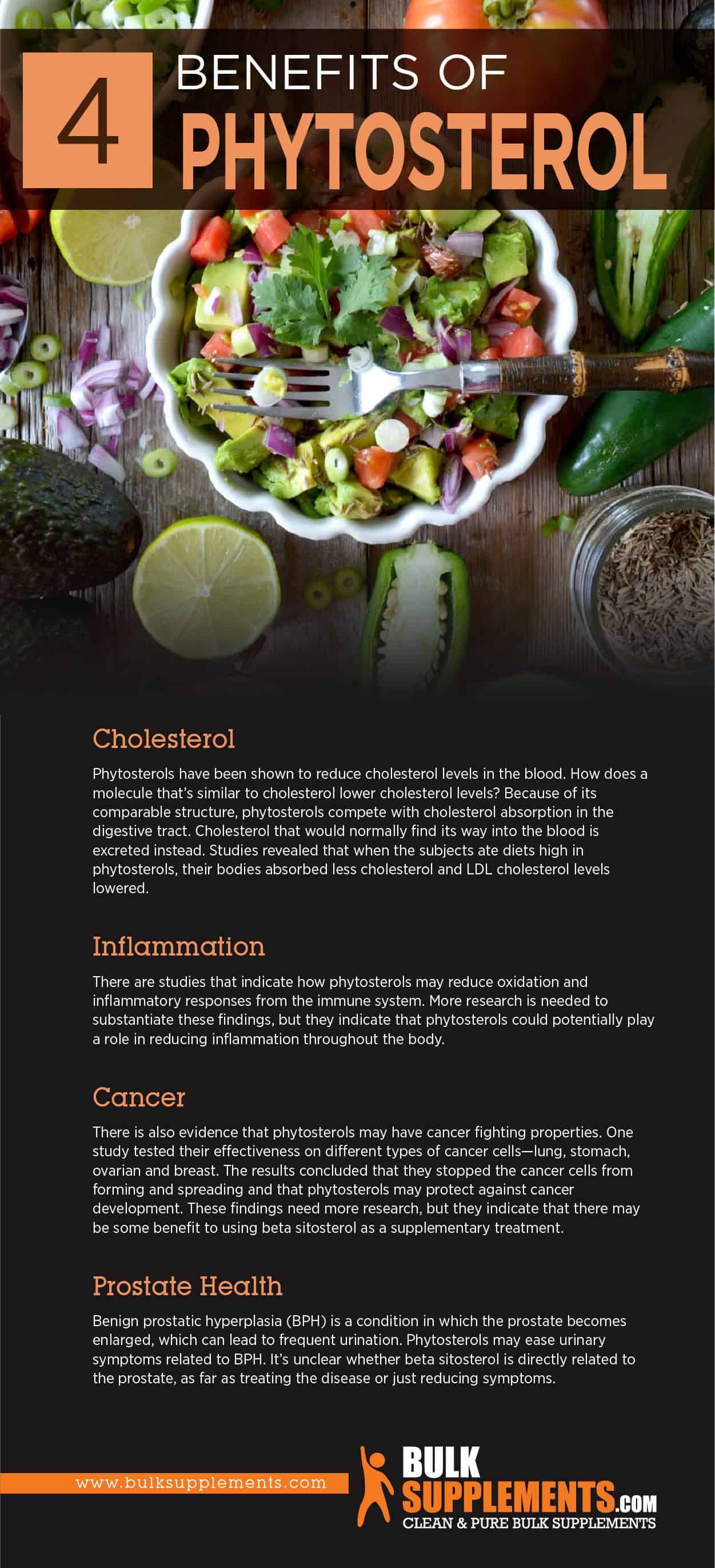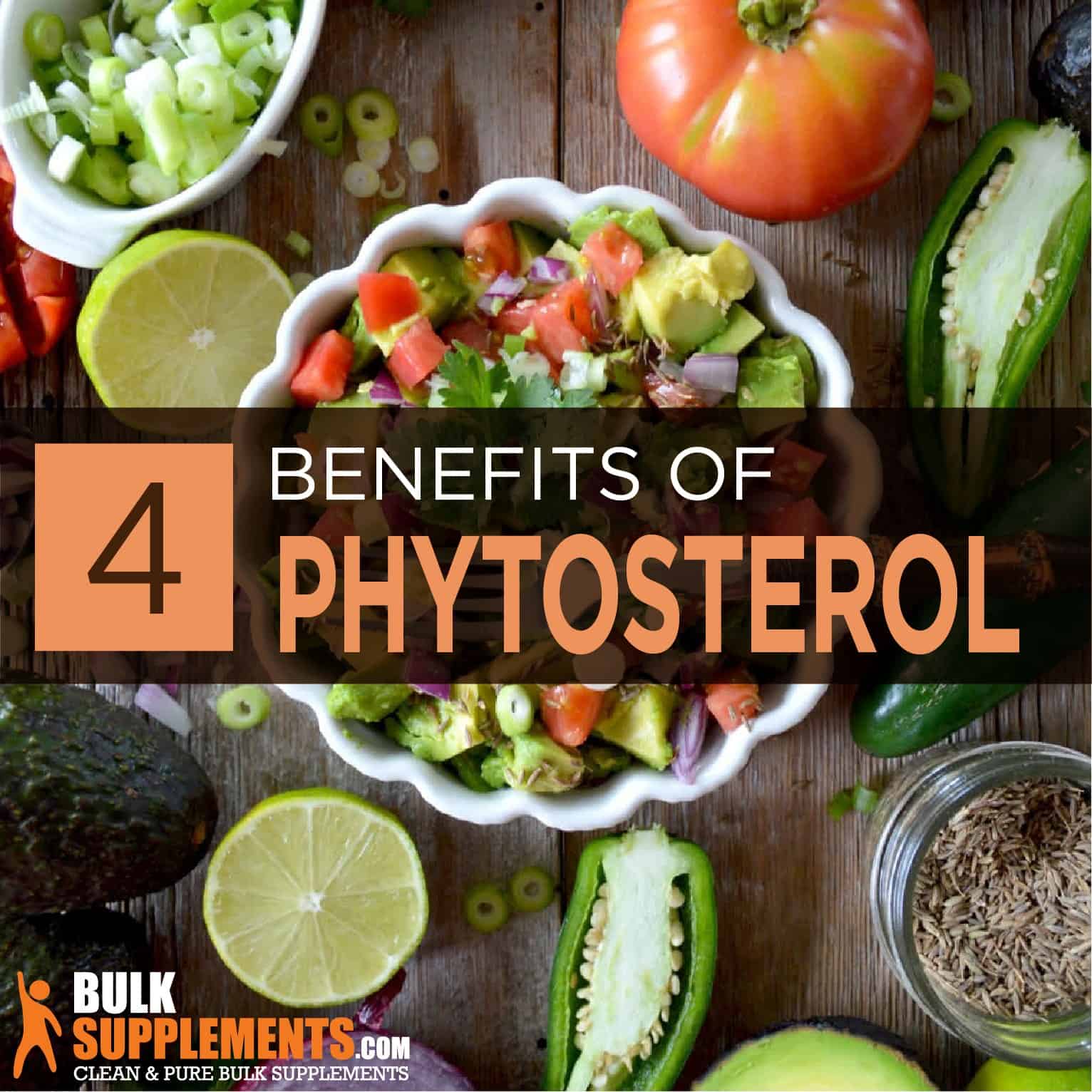What Is Phytosterol?
Phytosterols are a group of plant-based compounds, and beta-sitosterol is one variety of phytosterols that the medical industry uses for different health concerns. Your body cannot synthesize phytosterol, so you need to take the supplement as a dietary measure or eat foods high in the compound, such as nuts and whole grains. These molecules are structurally similar to cholesterol, and therefore they play a vital role in how your body absorbs cholesterol. However, unlike cholesterol, these molecules cannot convert to male hormones. (x) Since their structure is similar to cholesterol, phytosterols compete for absorption in the gut. That means that they block cholesterol, and the body ends up storing less cholesterol for healthier levels in your body. (x) (x)
Phytosterols are present in vegetables, fruits, legumes, nuts, whole grains and vegetable oil. However, the average consumption of these is less than 500 mg a day, which is not enough to lower your cholesterol. Thus, taking the supplement remedies this problem. (x)
When our prehistoric ancestors roamed the planet, they lived off of plant-based foods. They likely consumed large amounts of foods that contained phytosterols. More science-based evidence suggests that we should reintroduce the high consumption of plant food in our diet for healthier bodies all around. (x)
Benefits of Phytosterols
With more and more scientific evidence supporting the intake of phytosterols, take a look at the benefits you may experience when you avail yourself of this supplement. Please check with your physician wherever you start a new supplement, making sure it helps your body’s health, not the opposite. Some include:
- Cholesterol
Phytosterols are plant sterols and stanols, found naturally in plants. In 1950, research showed they reduce cholesterol levels in the blood. How does a molecule that’s similar to cholesterol lower cholesterol levels? Because of their comparable structure, phytosterols compete with cholesterol absorption in the digestive tract. Cholesterol would typically find its way into the blood but end up excreted instead. (x) Studies revealed that when the animal subjects ate diets high in phytosterols, their bodies absorbed less cholesterol and LDL, cholesterol levels lowered. (x)
- Anti-Inflammatory
Some studies indicate how phytosterols may reduce oxidation and inflammatory responses from the immune system. The medical industry needs more research to substantiate these findings, but they suggest that phytosterols might play a role in reducing inflammation throughout the body. (x) (x) Particularly the area of cardiovascular disease as an adjunct to statin treatment. Statin is a medication commonly used to lower cholesterol. Currently, studies may determine statin is also an anti-inflammatory. (x)
- Fights Cancer
There is also evidence that phytosterols may have cancer-fighting properties. Their consumption may increase the antioxidant and enzyme activity in your body and reduce oxidative stress and free radicals that cause cancer. One study tested their effectiveness on different types of cancer cells — lung, stomach, ovarian and breast. The results concluded that they stopped the cancer cells from forming and spreading and that phytosterols may protect against cancer development. (x) These findings need more research, but they indicate that there may be some benefit to using beta-sitosterol as a supplementary treatment.
- Improves Prostate Health
Benign prostatic hyperplasia (BPH) is a condition in which the prostate becomes enlarged, leading to frequent urination. (x) Phytosterols may ease urinary symptoms related to BPH. (x) It’s unclear whether beta sitosterol directly treats the prostate, as far as managing the disease or just reducing symptoms. Either way, studies show a positive result from using the supplement, showing significant improvements in urinary flow — but does not reduce your prostate size. (x)
Side Effects of Phytosterols
Beta sitosterol supplements are generally safe. However, occasionally they may cause mild gastrointestinal side effects. Beta sitosterol impacts cholesterol absorption in the digestive tract, and it may cause constipation or diarrhea. It may also cause an upset stomach or nausea. (x) If you experience adverse side effects taking the supplement and do not subside, lower the dose or discontinue the supplement.

Phytosterols in Food
Phytosterols are present in many healthy food groups. Whole grains, fruits, legumes, vegetables and nuts have the highest amounts. (x) (x) Here are some foods that contain phytosterols:
- Whole Grains
Unlike refined grains, whole grains still have the bran and germ of the seed. These parts of the grain seeds have valuable nutrients, including phytosterols. Rye bread, flaxseed and wheat germ are excellent sources of phytosterols.
- Legumes
There are also plenty of phytosterols in legumes, such as kidney beans, lentils and soybeans. (x)
- Nuts
Nuts are some of the most nutrient-dense foods available. They make healthy snacks, and many varieties of nuts also have phytosterols, like pistachios, cashews, macadamia nuts and almonds.
- Fruit
Fruits like oranges, bananas, blueberries and strawberries also contain phytosterols.
- Vegetables
Vegetables aren’t quite as rich in phytosterols as some other types of food. However, they still contain a lot of other nutrients. Broccoli, carrots, corn, Brussels sprouts, spinach and lettuce all contain phytosterols.
Phytosterol Dosage and Instructions
Beta-sitosterol is one type of phytosterol. The recommended dosage of beta-sitosterol phytosterol is 1,000 mg once or twice a day before meals. If you’re considering using beta-sitosterol supplements to help with a specific medical condition, consult a doctor first. Follow any medical advice from a physician when it comes to supplementation, and it is not an adequate replacement for medical treatment. Though, some studies suggest combining phytosterols with statins, a medical drug for high cholesterol.
Why Take Phytosterol Supplements?
Although there are plenty of dietary sources for phytosterols, there are numerous benefits of taking them as a supplement. For example, you can control the dosage and make sure that you’re receiving the same amount of it every day. Even with quality foods, nutrient levels will vary widely. If you’re consuming it for a medical condition, fluctuating levels can make it less effective and harder to monitor. By taking a supplement, you can control how much beta sitosterol is in your diet.
The body also does not absorb phytosterols easily. (x) Even with a diet high in phytosterols, your body may not actually be assimilating it all that much. Taking a supplement of beta-sitosterol ensures that your body receives enough to obtain its therapeutic benefits.
Another vital benefit of supplementing phytosterols is its cheaper than buying foods that contain beta sitosterol. Foods with a lot of it can become expensive. And since it’s hard for the body to absorb, you’ll have to eat a ton of these foods to get enough of it. By taking a beta sitosterol supplement, you can obtain the high dose you’ll need for it to be effective without having to scarf down a ton of food. Supplementation is more convenient, and it can save you time and money.
Where to Buy Phytosterol (Beta-Sitosterol) Supplements?
You can purchase phytosterol (beta-sitosterol) supplements at BulkSupplements.com. The company is an industry-leading manufacturer and distributor of pure dietary supplements.
BulkSupplements.com is not just a consumer brand. It also supplies pure ingredients to other food and supplement brands to make their products. All products at BulkSupplements.com are manufactured and tested according to current and proper manufacturing practices.
Are you interested in trying phytosterol (beta-sitosterol) supplements for your health, as described in this article? Contact BulkSupplements.com to place an order today.
The Bottom Line
Phytosterols are a group of compounds that come from plants. Because they are structurally similar to cholesterol, they are an excellent supplement if you want to lower cholesterol levels. It competes with cholesterol in the digestive system and keeps the body from absorbing too much of it. They may also have cancer-fighting properties, help with prostate issues and reduce inflammation in the body.
It is naturally present in foods, such as whole grains, fruits, vegetables, nuts and legumes. But they are also available as a supplement for ease and convenience. The supplement is generally safe, with only a few potential gastrointestinal side effects.
Whether the intention is to lower cholesterol levels or to protect the prostate, beta sitosterol is an excellent addition to just about any supplement routine. Remember to consult a physician before adding supplements to a dietary regime, as it does not replace medical advice or treatments.
These statements have not been evaluated by the Food and Drug Administration. These products are not intended to diagnose, treat, cure or prevent any disease.


